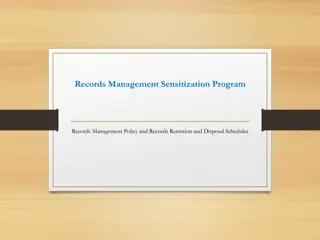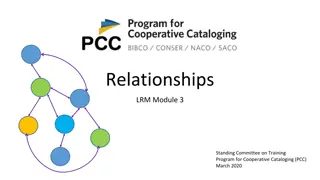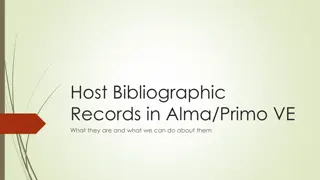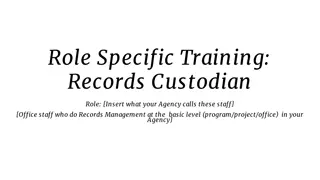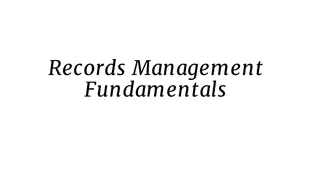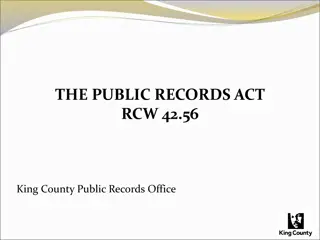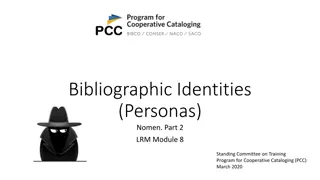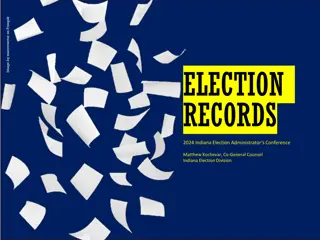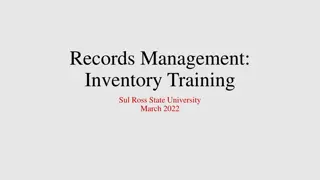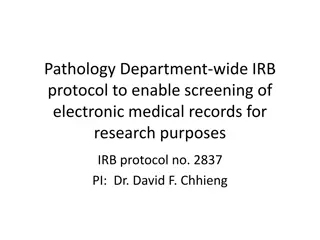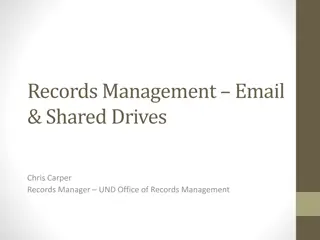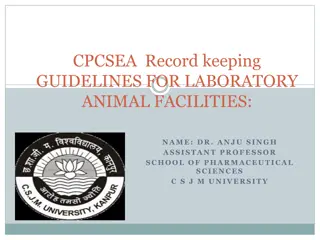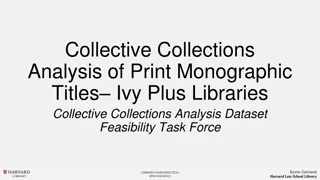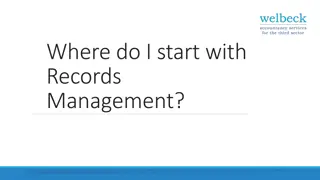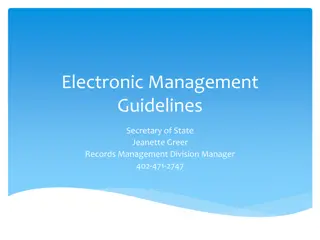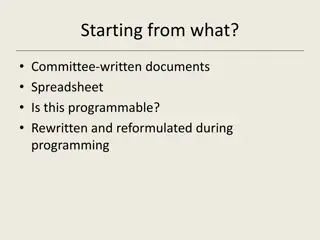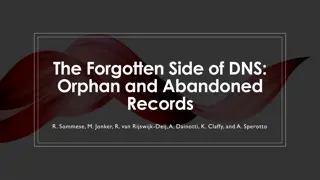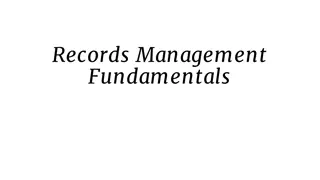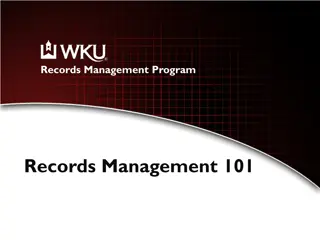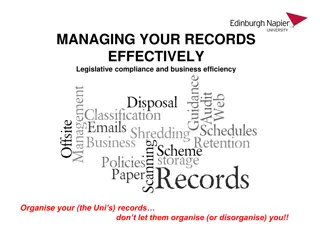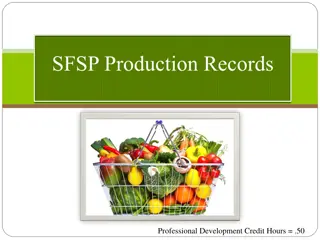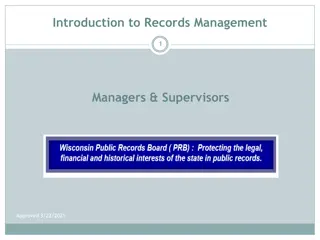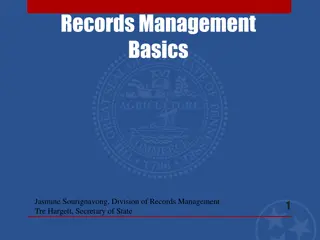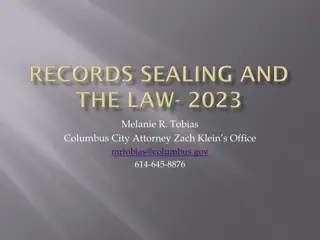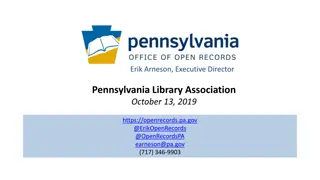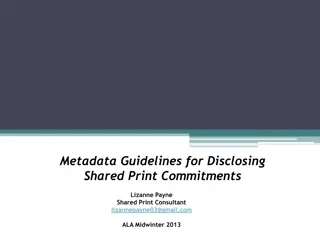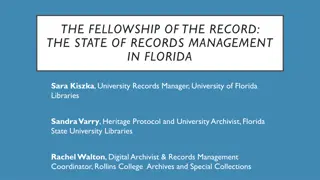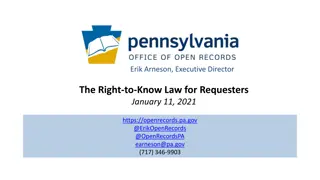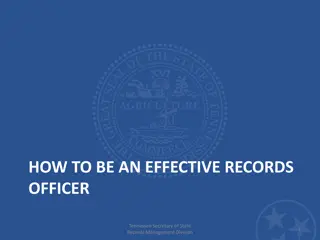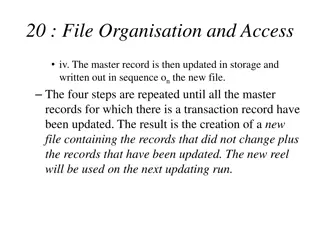NARA’s Regulation for Digitizing Permanent Records
NARA has issued regulations and guidance for digitizing permanent records, including the disposal of original analog records, with the aim of enhancing efficiency and accessibility. The process includes reviewing and updating regulations periodically, transferring metadata when records are transferr
1 views • 20 slides
Methods for Extending Streamflow Records and Their Importance
The presentation outlines methods for extending streamflow records, the reasons behind doing so, and the process of using the results. It includes examples of using data from long-term sites to estimate records at short-term sites. The importance of extending records is highlighted, emphasizing the
1 views • 48 slides
Standards and Formats in Bibliographic Information Exchange
International Standard Bibliographic Description (ISBD) defines rules for creating standardized bibliographic descriptions, facilitating information retrieval in libraries. MARC 21 Format for Bibliographic Data serves as a carrier for bibliographic information across various material types. ISO 2709
1 views • 13 slides
Comprehensive Records Management Guidelines for COMESA Secretariat
Explore essential aspects of records management for COMESA Secretariat, including sensitization programs, records retention policies, valuable records identification, information sensitivity classification, and vital records preservation. Learn about the importance of maintaining records with admini
7 views • 9 slides
Understanding Relationships in Bibliographic Universe
Relationships in bibliographic universe connect entities, providing context through entity-relationship models like IFLA LRM. Learn key terms, principles, and diagrams to identify relationships defined in IFLA LRM. Explore domains, ranges, inverse, recursive, and symmetric relationships. Enhance you
0 views • 23 slides
Understanding Host Bibliographic Records in Alma/Primo VE
Explore the concept of Host Bibliographic Records in the Alma/Primo VE system, which address the issue of linking single items to multiple bibliographic records. Learn how host bibs work, their creation during data migration, implications for library services, and the various types of host bibs used
0 views • 24 slides
Role-based Training for Records Custodians
Role-based training slides for Records Custodians at your Agency, focusing on managing records at the office level and implementing records management policies and procedures, including applying retention schedules, understanding RM staff structure and policy, coordinating with Records Liaisons, and
0 views • 8 slides
Understanding Records Management Fundamentals for Federal Agencies
This training course outlines the essential responsibilities and procedures for managing federal records. Discover the importance of records management, how to identify federal records, and key resources to support effective records management practices within your agency.
2 views • 63 slides
Understanding the Public Records Act in King County
The Public Records Act in King County emphasizes the people's sovereignty and their right to access governmental records. It defines public records, explains the meaning of writing, and lists various types of records. The content also covers the format of requests and the legal obligations of agenci
1 views • 21 slides
Understanding Bibliographic Identities and Nomen Clusters in Cataloging
Explore the concept of bibliographic identities, factors influencing the use of Nomens for individuals, and the relationship between Nomens and cataloging rules. Learn how one entity may have multiple Nomens and the significance of context in distinguishing between distinct bibliographic identities.
0 views • 12 slides
Public Records Regulations in Indiana Elections
Indiana's public records laws dictate that most agency records, including election materials, are publicly accessible. However, certain voter registration and election records have exemptions. The rules cover the availability of records related to voter registration, election administration, and pos
0 views • 12 slides
Effective Records Inventory Management Training at Sul Ross State University
This content presents an overview of records inventory training conducted at Sul Ross State University in March 2022. It covers the importance of records inventory, benefits, step-by-step guidance, identification of non-records, and cataloging procedures for individual and departmental records. The
1 views • 9 slides
Role-Based Training for Records Liaisons
Utilize these slides to develop role-based training for Records Liaisons at your agency, as defined by NARA. Customize the content to suit your agency's specific needs in records management. No approval is required from NARA for customization. The training covers the responsibilities of Records Liai
1 views • 7 slides
Pathology Department IRB Protocol for Electronic Medical Records Screening
Pathology Department's IRB protocol enables the screening of electronic medical records for research purposes, allowing members to review patient records and pathology slides. By fulfilling specific requirements and obtaining blanket IRB approval, researchers can access and analyze patient data for
0 views • 16 slides
Comprehensive Guide to Records Management at UND
Explore the essential aspects of records management at the University of North Dakota (UND), including records retention policy, lifecycle, definition of records, and mediums. Learn about the main objective of the Records Management department, records criteria, what constitutes a record, and what i
0 views • 26 slides
Understanding the Process of Sealing Criminal Records
Sealing criminal records means restricting public access to the records, although they are not destroyed and remain accessible to certain entities. Eligibility requirements vary, and action must be taken to seal records. This presentation covers the process, eligibility criteria, and what to expect
1 views • 36 slides
Guidelines for Recording Keeping in Laboratory Animal Facilities
The Committee for the Purpose of Control and Supervision of Experiments on Animals outlines the importance of maintaining detailed records in laboratory animal facilities to ensure the well-being and proper management of animals used in experiments. Records ranging from animal house plans, staff hea
4 views • 5 slides
Visual Highlights from British Library: Pin the Tail on the Donkey & Tillett: Bibliographic Relationships
Explore captivating images showcasing the games "Pin the Tail on the Donkey" and delve into bibliographic relationships with Tillett. Witness the fun and scholarly side of these subjects through vibrant visuals. Perfect for those interested in cultural traditions and library resources.
0 views • 4 slides
Cataloging Training Course Overview: FRBR, RDA, BSR
Delve into a comprehensive cataloging training course covering key topics such as FRBR concepts, RDA cataloging instructions, and BSR standards. Each day focuses on specific learning objectives to enhance your understanding of bibliographic records creation. Embrace the journey of mastering FRBR and
0 views • 84 slides
Collective Collections Analysis of Print Monographic Titles in Ivy Plus Libraries
The Ivy Plus Libraries are embarking on a project to collect, normalize, and analyze bibliographic and holdings records of single-part print monographs added to their catalogs between 2013-2017. The Task Force aims to enhance collaboration, streamline acquisitions, develop purchasing programs, and o
1 views • 6 slides
Getting Started with Records Management
Records management is a licensed work under the Creative Commons Attribution-NonCommercial-ShareAlike 4.0 International License. It involves understanding the definitions, purposes, stages, policies, procedures, and tools related to managing records effectively. This comprehensive regime encompasses
1 views • 40 slides
Unlocking the Power of Complex Searches with CCL Queries
Construct precise search filters using Common Command Language (CCL) queries to efficiently list records based on specific characteristics. Explore the commands and access points for creating custom search filters with CQL in Polaris PowerPAC. Learn key codes and tips to enhance your search capabili
1 views • 8 slides
Human Disease Symptom Network: Understanding Disease Relationships Through Symptoms and Genes
The Human Disease Symptom Network (HSDN) is constructed using a large-scale medical bibliographic records database to form a network of human diseases based on symptom similarities. By integrating disease-gene associations and protein-protein interaction data, correlations between symptom similarity
0 views • 37 slides
Best Practices for Electronic Records Management
Electronic records management guidelines outlined by Secretary of State Jeanette Greer emphasize the importance of retaining and managing electronic records effectively. Understanding the definition of records, handling cluttered records retention, and managing electronic records properly are crucia
1 views • 19 slides
Tool for Implementing Committee Reports in OCLC Connexion
This presentation uncovers the development process of a tool designed to implement committee reports within OCLC Connexion. From transforming spreadsheets to programming to final outcomes, each step of the tool's internal operation and capabilities is explained. The tool targets specific elements in
0 views • 31 slides
The Forgotten Side of DNS: Orphan and Abandoned Records
DNS zone administration can be complex, leading to misconfigurations like orphan and abandoned records. Orphan records are former glue records no longer needed, while abandoned records have related domains but are unnecessary. This analysis extends prior research, examining 2K TLDs over 25 months to
0 views • 19 slides
Enhancing Patient-Centered Care Through Improved CMC Records at The Hillingdon Hospitals NHS Foundation Trust
The Hillingdon Hospitals Trust aims to enhance patient-centered care by improving visibility and awareness of CMC (Coordinate My Care) records across generic teams through the development of specific patient information resources, tracking patient attendance at ED with CMC records, and optimizing th
0 views • 11 slides
Records Management Fundamentals Training Overview
This overview provides insights into a training course on Records Management Fundamentals, designed to educate Agency staff on their responsibilities in managing Federal records. It covers the importance of records management, identification of federal records, fundamental management principles, and
0 views • 63 slides
Effective Records Management Program Overview
Explore the comprehensive Records Management Program at Kentucky State University, covering the creation, maintenance, preservation, and destruction of records. Learn about public records, retention guidelines, record models, and schedules for various university departments. Understand the importanc
0 views • 14 slides
Efficient Records Management for Legislative Compliance and Business Efficiency
Learn how to effectively manage your records to ensure legislative compliance and enhance business efficiency. Discover the importance of aligning records management with strategic objectives and university values. Empower yourself with the knowledge and skills to organize records systematically whi
0 views • 37 slides
Understanding Production Records for Menu Planning in Food Service
This presentation provides valuable insights into the importance of maintaining accurate production records in food service to ensure compliance with meal pattern requirements. It covers topics such as the purpose of production records, who should be involved, where to keep the records, when to fill
0 views • 9 slides
Public Records Management Best Practices
Learn about public records management, including the definition of public records, the importance of records management, the life cycle of a record, why public records management is essential, and your responsibilities in managing public records effectively.
0 views • 19 slides
Understanding Records Management Basics and Regulations
Learn about records management fundamentals, the role of the Public Records Commission, definitions of records, and types of records regardless of format. Understand the importance of managing records properly and the regulations governing access to confidential records.
0 views • 12 slides
Understanding Records Sealing and Expungement in Ohio
Records sealing and expungement in Ohio are processes that allow individuals to have their criminal records either sealed from public view or completely destroyed. These acts are privileges, not rights, and applicants must meet specific criteria to be eligible. Expungement involves the physical dest
0 views • 21 slides
Understanding the Pennsylvania Right-to-Know Law
The Pennsylvania Right-to-Know Law (RTKL) governs access to state and local government records. This law ensures transparency by allowing individuals to request and access records created or held by agencies. The process involves submitting a request, agency response, possible appeal to the Office o
0 views • 24 slides
Metadata Guidelines for Disclosing Shared Print Commitments
Shared Print Metadata Guidelines aim to establish new Shared Print Institution Symbols and add them to bibliographic records for resource sharing. These guidelines involve creating MARC Local Holdings Records (LHRs) to document archiving commitments for journals. The Shared Print initiative supports
1 views • 12 slides
Challenges and Strategies in Records Management: Insights from Florida Institutions
Explore the state of records management in Florida through insights shared by records professionals from various universities. Discover the expertise levels required, collaboration with Records Management Liaison Officers, interactions with records creators, record transfer processes, outreach initi
0 views • 12 slides
Understanding Right-to-Know Law Basics
The Right-to-Know Law establishes the process for requesting records from state and local agencies. Requesters must seek records, not ask questions, and agencies can grant, deny, or partially fulfill requests. Appeals can be made to the Office of Open Records (OOR) and potentially to court. Records
0 views • 58 slides
Effective Records Officer Guidelines by Tennessee Secretary of State
Learn the essential skills and responsibilities required to be an effective Records Officer/Coordinator in Tennessee as outlined by the Secretary of State Records Management Division. Communication, organization, leadership, collaboration, critical thinking, and decision-making are crucial aspects f
0 views • 17 slides
Sequential File Maintenance and Organisation Process
In sequential file maintenance, the master records are updated and written to a new file in sequence after processing transaction records. This process continues until all relevant master records are updated, resulting in a new file with unchanged and updated records. Additional steps involve file s
0 views • 7 slides



